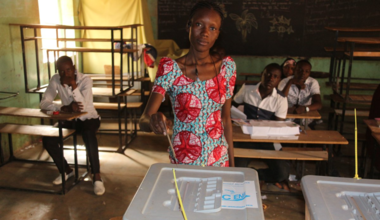S.C PRESIDENTIAL STATEMENT ON TRANSNATIONAL CRIME, DRUG TRAFFICKING, PIRACY, TERRORISM IN W.A -SAHEL
New York, 21 February 2012 -(S/PRST/2012/12) - “The Security Council reaffirms its primary responsibility for the maintenance of international peace and security, in accordance with the Charter of the United Nations.
“The Security Council expresses concern about the serious threats to international peace and stability in different regions of the world, in particular in West Africa and the Sahel Region, posed by transnational organized crime, including illicit weapons and drug trafficking, piracy and armed robbery at sea, as well as terrorism and its increasing links, in some cases, with transnational organized crime and drug trafficking. The Council stresses that these growing international threats, particularly in West Africa and the Sahel Region, contribute to undermining governance, social and economic development and stability, and creating difficulties for the delivery of humanitarian assistance, while threatening to reverse peacebuilding advances in the region.
“The Security Council is also strongly concerned by the increasing violence perpetrated by armed groups in the region, which has been exacerbated by the proliferation of weapons, from within and outside the region, that threaten peace, security and stability of States, recalls in this context its resolution 2017 (2011) and its previous resolutions and presidential statements on the impact of the transnational threats mentioned above and welcomes regional initiatives such as the ECOWAS Convention on Small Arms and Light Weapons, Their Ammunition and Other Related Material.
“The Security Council acknowledges the importance of system-wide United Nations action, in order to offer coherent and coordinated responses to transnational threats mentioned above, including through the use of best practices and exchange of positive experiences from relevant initiatives in other regions of the world, such as the Paris Pact.
“The Security Council notes with concern that the threats mentioned above may threaten the security of countries on its agenda, including post-conflict States, and encourages the coordination of United Nations actions as well as Member States' actions in fighting these threats. The Security Council encourages international long-term capacity-building efforts and regional initiatives. In this regard, the Security Council commends the important work of the United Nations Office on Drugs and Crime (UNODC) and encourages the UNODC Executive Director to further assist States of the region, in collaboration with other relevant UN entities, and calls on UNODC to brief the Council as necessary.
“The Security Council calls on States that have not yet ratified or implemented the relevant international conventions, such as the Single Convention on Narcotic Drugs of 1961 as amended by the 1972 Protocol, the Convention on Psychotropic Substances of 1971, the United Nations Convention against Illicit Traffic in Narcotic Drugs and Psychotropic Substances of 1988, the United Nations Convention against Transnational Organized Crime of 2000 and the Protocols thereto and the United Nations Convention against Corruption of 2003, to do so.
“The Security Council recognizes the support provided by bilateral and multilateral actors, including the European Union, African Union and ECOWAS, to efforts aimed at combating transnational organized crime and calls on the international community and the United Nations system to strengthen their cooperation with regional organizations, and initiatives such as the Bamako Ministerial Conference on Impunity and Human Rights in West Africa, the Ministerial Conference of African Atlantic States, the Group of Eight Paris Conference on Transatlantic Trafficking of Cocaine and the Transatlantic Symposium on Dismantling Transnational Illicit Networks.
“The Security Council commends the States and leaders of West Africa and the Sahel Region for the important initiatives and measures they have adopted, at national and regional levels, to tackle the threat of organized crime in their region. The Security Council urged States of the Region to extend their support to the African Union Plan of Action on Drug Control and Crime Prevention 2007-2012 and the “ECOWAS Regional Action Plan to address the Growing Problem of Illicit Drug Trafficking, Organized Crime and Drug Abuse in West Africa (2008-2011)” and to renew the ECOWAS Action Plan into 2012 and beyond. The Security Council also urged them to extend their support to the West Africa Coast Initiative (WACI). The Security Council calls on the international community to continue to support these initiatives, including border control.
“The Security Council reaffirms its commitment to international law and the Charter of the United Nations, and to an international order based on the rule of law and international law, which are essential for cooperation among States in addressing common challenges, thus contributing to the maintenance of international peace and security. In this regard, the Security Council stresses the importance of implementing relevant international agreements, and of strengthening international, regional and transregional cooperation including capacity-building in justice and security institutions in order to investigate and prosecute, as appropriate, persons and entities responsible for these crimes.
“The Security Council invites the Secretary-General to consider these threats as a factor in conflict prevention strategies, conflict analysis, integrated missions’ assessment,planning and peacebuilding support and to consider including in his reports analysis of the role played by these threats in situations on the Council’s agenda, in view to strengthen a coordinated and synergetic effort by relevant United Nations entities and requests him to report on specific recommendations on ways and means in which the Council may deal with the question of transnational organized crime including drug trafficking in West Africa and the Sahel region, taking into account the views of Member States, recent experiences in the field and the contents of this statement”.
 UN
UN



